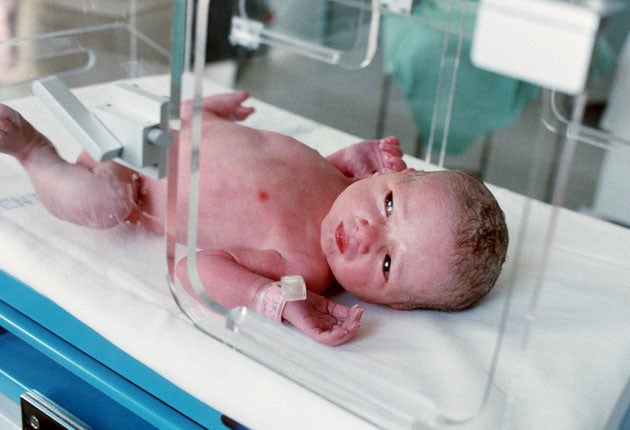Anger over plan to close small maternity units

Your support helps us to tell the story
From reproductive rights to climate change to Big Tech, The Independent is on the ground when the story is developing. Whether it's investigating the financials of Elon Musk's pro-Trump PAC or producing our latest documentary, 'The A Word', which shines a light on the American women fighting for reproductive rights, we know how important it is to parse out the facts from the messaging.
At such a critical moment in US history, we need reporters on the ground. Your donation allows us to keep sending journalists to speak to both sides of the story.
The Independent is trusted by Americans across the entire political spectrum. And unlike many other quality news outlets, we choose not to lock Americans out of our reporting and analysis with paywalls. We believe quality journalism should be available to everyone, paid for by those who can afford it.
Your support makes all the difference.Small NHS maternity units face closure to improve safety standards and help economies across the health service.
Experts said yesterday that those maternity units lacking access to specialist expertise should be closed to protect the lives of mothers and babies – although such closures will mean some expectant mothers having to travel further to give birth.
Responding to yesterday's investigation by The Independent into the crisis in maternity care, Nigel Edwards, the acting chief executive of the NHS Confederation, representing NHS trusts, said: "There is a broad consensus that there needs to be a substantial change in the provision of maternity services involving the downgrading or closure of smaller units to provide safer services. The changes are necessary in order to have appropriate consultant cover but it is important they are not seen as a cost-saving measure, though they may prevent trusts spending more."
Five of the nine NHS regions in England are planning to reconfigure maternity services, involving the closure of smaller units.
But the plans have provoked protests across the country. In Salford, 37,000 people signed a petition against closure of the maternity unit at Salford Royal Hospital, which was handed in to Downing Street. In Kent, Tory MP James Brokenshire intervened to halt the closure of maternity services at Queen Mary's Hospital, Sidcup. In Rochdale, the Manchester United soccer star Paul Scholes backed the Hands Off Our Hospital campaign against the closure of Rochdale Infirmary's maternity unit, where his children were born.
Last month the Health Secretary, Andrew Lansley, halted plans to transfer maternity and accident and emergency services from Chase Farm Hospital in Enfield after they had been approved by NHS London. Mr Lansley gave local politicians and campaigners who had opposed the move until Thursday to come up with alternative proposals.
London's maternity services are under the greatest pressure from a sharply rising birth rate, driven by an influx of migrants from Europe in their 20s and 30s, the peak age for having children, and difficulties in recruiting midwives.
A three-year cash injection of £300 million into maternity services by the former Labour government in 2008 has come to an end and some trusts are trying to cut funding to maternity services at a time when demand is rising.
Tony Falconer, the president of the Royal College of Obstetricians, said maternity services in Britain varied from "tiny" units delivering 1,300 babies a year to mega-units that deliver up to 8,000.
"Somewhere between 5,000 and 6,000 deliveries seems to be a comfortable number," he said. "If you get too big you lose the friendliness of the unit and patients complain they are just a number. But in rural areas you can't say smaller units have to close because that would mean some women having to travel 60 miles."
A report by the Centre for Maternal and Child Enquiries last month found wide variations in the perinatal mortality rate around the country. In 14 unnamed trusts the death rate was high enough to require investigation. Nationally, there were 6,070 perinatal deaths in 2009 and 790,781 live births, a mortality rate of 7.6 per 1,000.
Elizabeth Duff, a policy adviser at the National Childbirth Trust, rejected the move towards fewer, bigger maternity units to improve safety.
"We don't agree the answer is all about bigger hospitals and women having to travel further," she said. "I can see that when everything is as stretched as it is now, having rows of women delivering in lines may seem like the way to go but it does not deliver good care and it is not what women want."
THE SERVICES AT RISK
Queen Mary’s Hospital, Sidcup
Queen Elizabeth II Hospital, Welwyn Garden City
Sandwell General Hospital, Birmingham
Heart of England Foundation Trust, Midlands
Maidstone Hospital, Kent
Solihull Hospital, West Midlands
King George Hospital, Redbridge, east London
Chase Farm Hospital, Enfield, north London
Leicester General Hospital
Manchester Hospitals Trust.
Join our commenting forum
Join thought-provoking conversations, follow other Independent readers and see their replies
Comments